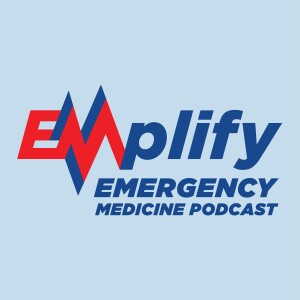
EXTRA Supplement Podcast - Concussion in the Emergency Department: A Review of Current Guidelines - Trauma EXTRA Supplement (Trauma CME)
 2019-09-20
2019-09-20
Download
Right click and do "save link as"
Show Notes
Dr. Susan Kirelik, a concussion specialist and emergency medicine physician, discusses the key points of concussion diagnosis and management from the perspective of the emergency medicine clinician. The topics covered include:
The signs and symptoms of concussion and how it is diagnosed in the ED
The initial evaluation of a patient presenting with a head injury, including tools for determining when neuroimaging is indicated
Screening tools for the evaluation of patients with suspected concussion, such as the VOMS examination and the SCAT5 and Child SCAT5 tools
Management of patients in the ED after making a concussion diagnosis and the role of rest, antiemetics, and acute pain management for these patients
The importance of aftercare instructions when discharging concussed patients, in the context of new guidelines for concussion recovery
The risk factors for prolonged recovery from concussion and resources for concussion recovery
Patients seeking concussion clearance in the ED
Addressing patient or parent questions about the long-term complications of concussion, such as second impact syndrome, the potential for cumulative effects of multiple concussions, and risk for CTE (chronic traumatic encephalopathy)
Susan B. Kirelik is the Medical Director of the Rocky Mountain Pediatric OrthoONE Center for Concussion and is an attending pediatric emergency medicine physician at the Rocky Mountain Hospital for Children in Denver, Colorado.
Read the article: Concussion in the Emergency Department: A Review of Current Guidelines - Trauma EXTRA Supplement (Trauma CME)
References
McCrory P, Meeuwisse W, Dvorak J, et al. Consensus statement on concussion in sport-the 5(th) international conference on concussion in sport held in Berlin, October 2016. Br J Sports Med. 2017;51(11):838- 847. (Consensus statement)
Meeuwisse WH, Schneider KJ, Dvorak J, et al. The Berlin 2016 process: a summary of methodology for the 5th International Consensus Conference on Concussion in Sport. Br J Sports Med. 2017;51(11):873-876. (Conference summary)
Kuppermann N, Holmes JF, Dayan PS, et al. Identification of children at very low risk of clinically-important brain injuries after head trauma: a prospective cohort study. Lancet. 2009;374(9696):1160-1170. (Prospective cohort study; 42,412 patients)
Stiell IG, Wells GA, Vandemheen K, et al. The Canadian CT Head Rule for patients with minor head injury. Lancet. 2001;357(9266):1391-1396. (Prospective cohort study; 3121 patients)
Mucha A, Collins MW, Elbin RJ, et al. A brief vestibular/ocular motor screening (VOMS) assessment to evaluate concussions: preliminary findings. Am J Sports Med. 2014;42(10):2479-2486. (Cross-sectional study; 64 patients)
Links to tools and publications mentioned in the podcast:
PECARN Pediatric Head Trauma: Official Visual Decision Aid for Clinicians
Vestibular/Ocular-Motor Screening (VOMS) for Concussion
SCAT5 tool
Child SCAT5 tool
REAP concussion management (NOTE: this is the new URL for “center4concussion.com,” which is mentioned in the podcast)
Tip sheets for educators, parents, and healthcare providers on managing concussion recovery in the classroom
view more
More Episodes
Substance Use in Adolescents
 2023-10-02
2023-10-02
 2023-10-02
2023-10-02
Rectal Bleeding
 2023-09-01
2023-09-01
 2023-09-01
2023-09-01
Pulmonary Embolism with Al Sacchettii, MD
 2023-08-01
2023-08-01
 2023-08-01
2023-08-01
Acute Pericarditis & Myocarditis
 2023-07-05
2023-07-05
 2023-07-05
2023-07-05
Hypertensive Emergencies
 2023-06-01
2023-06-01
 2023-06-01
2023-06-01
GI Foreign Body Ingestion
 2023-05-03
2023-05-03
 2023-05-03
2023-05-03
Career Longevity
 2023-04-13
2023-04-13
 2023-04-13
2023-04-13
Infective Endocarditis-Associated Stroke
 2023-04-03
2023-04-03
 2023-04-03
2023-04-03
Pediatric Electrolyte Emergencies
 2023-03-02
2023-03-02
 2023-03-02
2023-03-02
Opioids in Children and Adolescents
 2023-02-02
2023-02-02
 2023-02-02
2023-02-02
Allergic Reactions and Anaphylaxis
 2023-01-17
2023-01-17
 2023-01-17
2023-01-17
Pediatric Septic Shock
 2023-01-03
2023-01-03
 2023-01-03
2023-01-03
Influenza
 2022-12-12
2022-12-12
 2022-12-12
2022-12-12
Angioedema
 2022-12-01
2022-12-01
 2022-12-01
2022-12-01
Pediatric Ocular Trauma
 2022-11-03
2022-11-03
 2022-11-03
2022-11-03
Career Disillusionment
 2022-10-18
2022-10-18
 2022-10-18
2022-10-18
Pediatric Firearm Injuries to the Extremity
 2022-10-02
2022-10-02
 2022-10-02
2022-10-02
International Medical Corps, Ukraine
 2022-08-15
2022-08-15
 2022-08-15
2022-08-15
012345678910111213141516171819
Create your
podcast in
minutes
- Full-featured podcast site
- Unlimited storage and bandwidth
- Comprehensive podcast stats
- Distribute to Apple Podcasts, Spotify, and more
- Make money with your podcast
It is Free
- Privacy Policy
- Cookie Policy
- Terms of Use
- Consent Preferences
- Copyright © 2015-2024 Podbean.com




